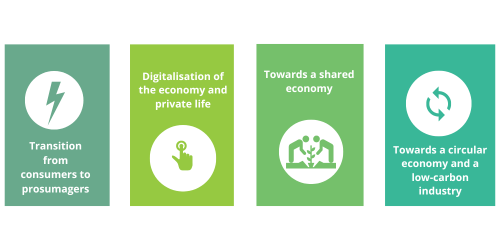The four following trends picked by the newTRENDs project are expected to have asignificant impact on increasing or reducing energy demand in the European Union in thecoming years.

New Societal Trends are understood as societal developments arising from general Megatrends, which can have potentially large (increasing or decreasing) impacts on energy consumption as well as cross-sectoral demand shifts.
These trends may not only affect the amount of energy consumed, but also its preferred form by consumers, or the time period of the greatest burden on the energy grid. The larger the sections of society that succumb to these changes, the greater the evolution will take place throughout the energy system.
To achieve the Paris Agreement goals, two central strategies have to be implemented in all countries:
i) enhancing energy efficiency (EE) and
(ii) decarbonizing remaining energy supply and demand.
Scenarios with different focuses and assumptions have been developed to map this development until 2050. While these scenarios present a major step forward beyond previous modelling approaches by integrating societal trends, much more progress is necessary to enhance the empirical basis for such trends and their representation in models.
In this context, the project newTRENDs is developing the analytical basis for a “2050 Energy Efficiency Vision” taking into account New Societal Trends in energy demand modelling.
This briefing is based on the newTRENDs report “Diagnosis of energy demand-side policy needs at European level“ authored by Research and Innovation Centre Pro-Akademia (RIC) and WISE, and providing a diagnosis of energy demand-side policy needs at European level, with a particular focus on effective implementation of the Energy Efficiency First principle.
Policy needs for prosumaging
Currently, energy needs shape the behavior of electricity consumers. Electricity is passively demanded and served through energy via the electricity distribution network. By contrast, prosumers may choose to invest in electricity generation and storage units installed on-site, thus locally covering part of their electricity needs but without further changes in their behavioral characteristics.
Equipping the users of electricity that are already prosumers with smart meters transforms them into Active Electricity Consumers, i.e. Prosumagers –a term coined within newTRENDs as a new step in the evolution of the electricity consumer.
Within newTRENDs, the effort to identify New Societal Trends regarding prosumaging indicates that improving the existing residential model will allow studying the Impact of prosumaging in greater depth.
Policy needs for digitalisation of economy and private life
For digitalisation, this part describes existing and planned EU-level policies which are relevant from the point of view of energy consumption in the tertiary sector in the context of digitalisation. In defining the scope of analysis, we focus on the tertiary sector because it already relies on ICT more than other sectors and is expected to undergo further digital transformation as with the development of new digital technologies and innovations that will further transfer existing services to the digital sphere and lead to the emergence of an array of brand new services relying on such technologies as big data or artificial intelligence.
Policy needs for circular economy
It is expected that circular economy can contribute significantly to the achievement of climate targets of the Paris Agreement while enabling further economic growth.
Circular economy can also reduce the prospective demand for new process technologies and carbon neutral secondary energy carriers. This is relevant for the decarbonization of the energy system considering the limited availability of renewable energy sources (RES) and to reduce overall system costs. This section provides the existing and emerging energy demand side policies and instruments addressing circular economy and low carbon industry in the European Union.
Policy needs for a shared economy
This last part describes existing and planned EU-level policies that are relevant from the point of view of energy consumption in the transport sector in the context of the rise of sharing economy.
In defining the scope of sharing economy, we follow the approach adopted by the Commission in the communication “A European agenda for the collaborative economy”.
Sharing economy is thus understood as “business models where activities are facilitated by collaborative platforms that create an open marketplace for the temporary usage of goods or services often provided by private individuals”.


